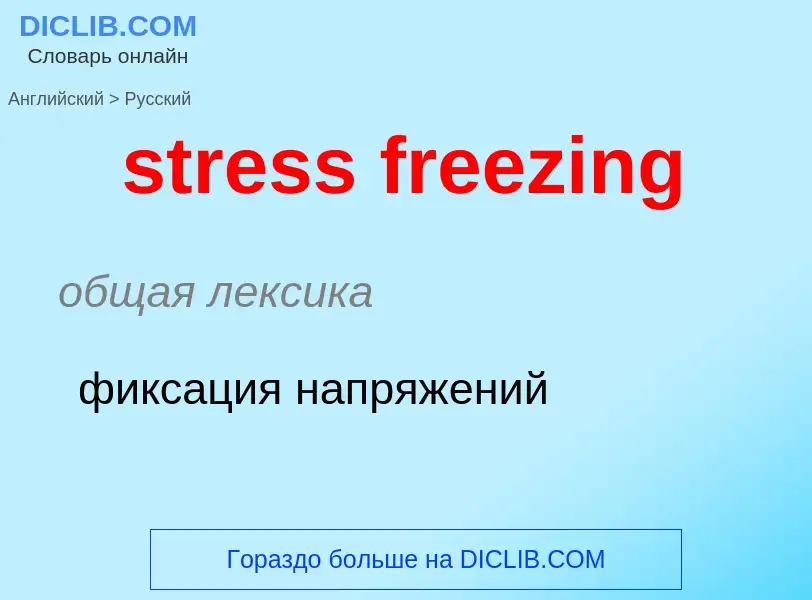Μετάφραση και ανάλυση λέξεων από την τεχνητή νοημοσύνη ChatGPT
Σε αυτήν τη σελίδα μπορείτε να λάβετε μια λεπτομερή ανάλυση μιας λέξης ή μιας φράσης, η οποία δημιουργήθηκε χρησιμοποιώντας το ChatGPT, την καλύτερη τεχνολογία τεχνητής νοημοσύνης μέχρι σήμερα:
- πώς χρησιμοποιείται η λέξη
- συχνότητα χρήσης
- χρησιμοποιείται πιο συχνά στον προφορικό ή γραπτό λόγο
- επιλογές μετάφρασης λέξεων
- παραδείγματα χρήσης (πολλές φράσεις με μετάφραση)
- ετυμολογία
stress freezing - translation to ρωσικά
общая лексика
фиксация напряжений
[əd'və:siti]
общая лексика
неблагоприятная обстановка
существительное
общая лексика
напасти
несчастья
превратности судьбы
напасти, несчастья, бедствия
специальный термин
неблагоприятный фактор
неблагоприятная обстановка
['fri:ziŋ]
общая лексика
замораживание
вымораживание
замерзание
выморозка
замерзающий
замораживание пищевых продуктов
замораживающий
затвердевание
затвердевающий
кристаллизация
леденящий
морозильный
оледенение
промерзания
смерзание
этология
замирание
топография
ледостав
медицина
общее охлаждение организма (замерзание)
нефтегазовая промышленность
прихват (инструмента в скважине)
замерзание, застывание
примерзание
Смотрите также
прилагательное
общая лексика
замораживающий
охлаждающий
ледяной
холодный
отталкивающий
леденящий
охлаждающий, замораживающий
синоним
существительное
['fri:ziŋ]
общая лексика
замерзание
замораживание
застывание
затвердевание
отморожение
замораживание (заработной платы, цен и т. п.)
замерзание, застывание
экономика
блокирование
металлургия
«козёл» (в домне)
Βικιπαίδεια
Abiotic stress is the negative impact of non-living factors on the living organisms in a specific environment. The non-living variable must influence the environment beyond its normal range of variation to adversely affect the population performance or individual physiology of the organism in a significant way.
Whereas a biotic stress would include living disturbances such as fungi or harmful insects, abiotic stress factors, or stressors, are naturally occurring, often intangible and inanimate factors such as intense sunlight, temperature or wind that may cause harm to the plants and animals in the area affected. Abiotic stress is essentially unavoidable. Abiotic stress affects animals, but plants are especially dependent, if not solely dependent, on environmental factors, so it is particularly constraining. Abiotic stress is the most harmful factor concerning the growth and productivity of crops worldwide. Research has also shown that abiotic stressors are at their most harmful when they occur together, in combinations of abiotic stress factors.







